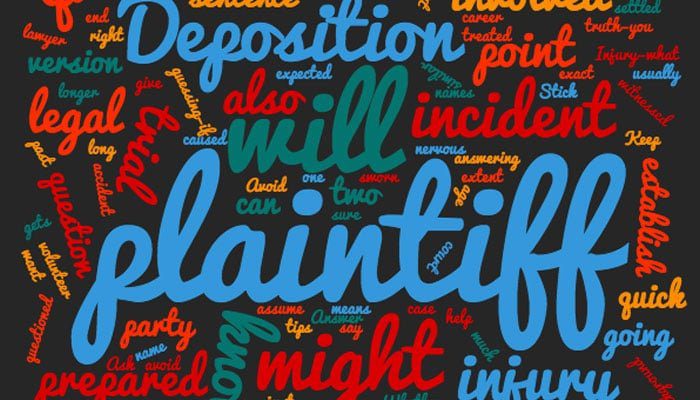If you are a involved in a personal injury case as the plaintiff, the defendant, or as a witness, you might be going into the Deposition not knowing what will be involved. If you want to be as prepared as possible, here is a quick guide on the basics that should know going into it.
What Is A Deposition?
The Deposition is simply a meeting between each party — the plaintiff and the defendant — and their lawyers. Court reporters are also present to swear in each party to a legal oath as if it were a trial and to record what happens. Witnesses might also be there to be questioned.
The point of a deposition is to establish each party’s version of the incident in question. The defendant has the legal right to know what information about the incident the plaintiff has and the nature of their injuries so they can be prepared for a trial unless it is settled before it gets to that point. The plaintiff will usually meet with their lawyer beforehand so they will have all their information prepared.
What Questions Will Be Asked?
Because the point of the Deposition is to establish each party’s version of events, most of the questions will be focused to that end. There might be some variation depending on the exact nature of the incident but in general there will be these same basic questions:
- Background—what is the plaintiffs’ name, age, address, family, education, career information?
- Legal history—has the plaintiff been involved in any other legal claims or crimes?
- Physical history—has the plaintiff suffered any injury or illness in the past, including hospital visit and the names of the doctors?
- Incident—can the plaintiff describe the accident that caused their injury?
- Injury—what is the extent of the injury that the plaintiff suffered including, where were they treated, and by what doctor?
Witnesses might also be brought into a Deposition to be asked similar questions about their background and what they witnessed during the incident in front of both lawyers.
How Should I Answer Questions?
Whether you are the plaintiff, the defendant, or a witness you might be nervous about answering the questions that you will be asked, because you don’t know what is expected of you. Here are some quick tips to help:
- Avoid guessing—if you’re not sure about a detail you can say so
- Ask for clarification—don’t assume you know exactly what the question means if you’re uncertain
- Keep it short—answers should not be much longer than a sentence or two
- Tell the truth—you will be sworn in by the court reporter just as if you were at a trial
If you are the plaintiff you should avoid the urge to give long answers. Stick to one or two sentence answers and do not volunteer information unless asked directly about it.














